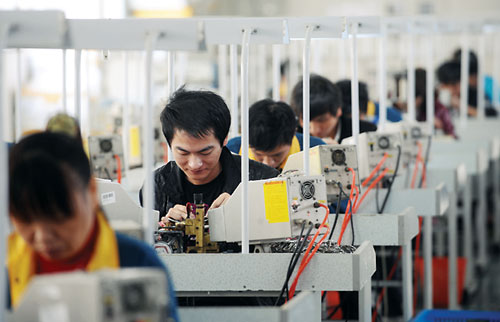Help offered to businesses
By Yu Ran (China Daily) Updated: 2012-02-01 08:58
|
 Zhejiang Center Group, a maker of spectacles, resumed production after a restructuring in October. [Photo/China Daily] |
Hard-pressed companies get respite after city launches financial reform
WENZHOU, Zhejiang - Wenzhou's economic difficulties are under control and some enterprises that closed down have resumed operations following measures to improve the financial situation in the city.
"The credit crisis has been controlled with a series of policies carried out by the government by ensuring a sufficient amount of bank loans were available for enterprises by the end of year," said Chen Jun, the deputy secretary-general of Wenzhou government.
The local government released a draft plan of innovative financial reform in November and is waiting for approval from the central government before instituting it.
According to the plan, the number of small-loan companies rose to 50 from the previous 30 at the end of 2011 offering up to 12 billion yuan ($1.9 billion). There will be 100 of them by the end of this year.
To support small and medium-sized enterprises (SMEs), five more authorized agencies will be launched this year with the task of offering private loans to SMEs in particular.
"The only way to solve the problem is by replacing the underground running of private capital with reasonable authorized loans for every company in need," said Zhou Dewen, chairman of the Wenzhou Small and Medium-sized Enterprises Development Association.
The authorities have budgeted for 80 billion yuan by 2013 for small-loan companies in Wenzhou to dole out.
"We've seen the government react quickly when the crisis occurred in Wenzhou three months ago. It was a relief knowing the lack of financial support we were suffering could be eased sooner or later," said Zhang Beilei, the manager of Wenzhou Gaotian Shoes.
Zhang added that although the measures have yet to change the current tightened lending situation, she believed the money problems would be solved this year.
With assistance from the local government, the recovery and restructuring of enterprises that had closed down was slowly being put into practice.
Five enterprises in the city had started restructuring using 50 million yuan contributed by the local government. Fifteen business owners who fled the city had returned by the end of November.
Zhejiang Center Group, a maker of spectacles, resumed production on Oct 20 with almost 80 percent of its former employees returning to work. It was one of the first to do so.
Hu Fulin, the company's chairman, fled to the United States on Sept 21, leaving behind debts of up to 2 billion yuan, including 1.2 billion yuan in high-interest loans from underground banks. He returned to Wenzhou on Oct 10 to restructure the company with the help of the local government.
Over the past two months, the output of products in Hu's factory has enjoyed an average growth of 40 to 50 percent a week.
"The number of international orders increased rapidly in the past two months and I am currently negotiating with a client from Hong Kong, which will probably result in two to three large orders for the year," said Hu.
It's not such good news for the private money dealers in the underground banking world who have lost business or suffered defaults.
"I stopped collecting money from individuals and lending to SMEs at the end of September because it was too risky. I wouldn't know whether the money would be paid back on time," said Liu Jianxiu, a private moneylender who used to collect interest from individuals she made loans to at a monthly rate of 3 to 4 percent. She said she was still owed about 3 million by SMEs.
"I've already received a small factory as payback from an indebted borrower who has nothing left and I am not sure when and how I will get the remaining money back," said Liu.
Like Liu, most of the city's private money collectors have decided to end their underground banking activities for the moment and have adopted a wait-and-see policy until the market turns more favorable.
- Chinese stocks down on Brexit fears
- Hong Kong's stocks extend gains to fifth day
- Foreign takeovers in Germany are 'positive'
- BOC's international SME matchmaking on the rise
- Warren Buffett invests in Oklahoma State kin, Tyler Buffett
- People business that goes beyond numbers
- Experts mull impact of UK referendum
- Investors welcome tests next week for Shenzhen-HK trading link


















